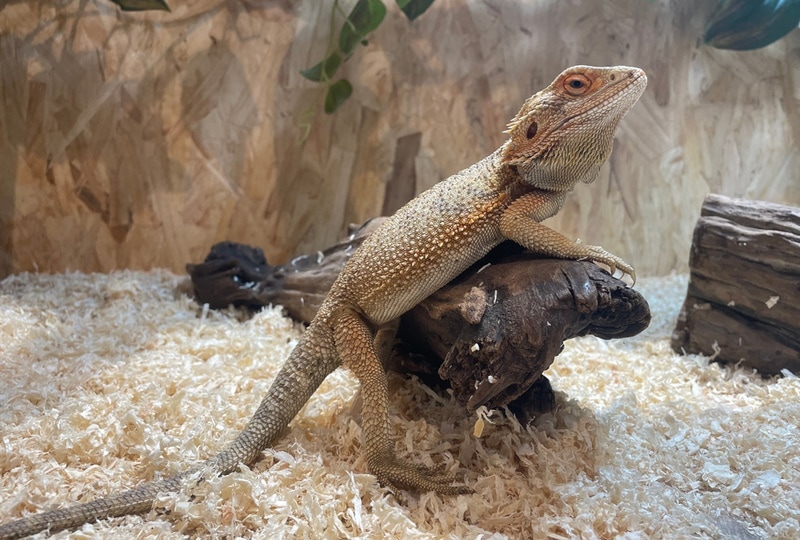How to Calm Down a Bearded Dragon: 5 Simple Ways

Updated on
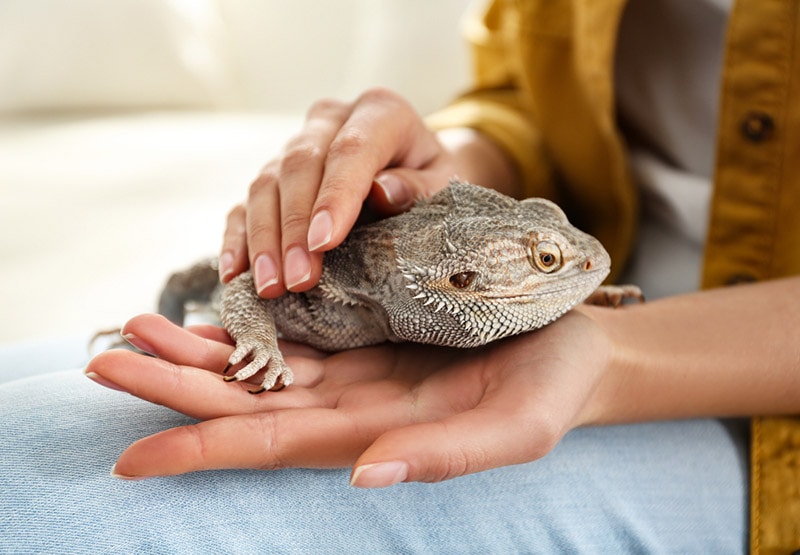
Bearded dragons stress easily and often won’t hesitate to tell you if something’s wrong. You might find them lashing out, getting nippy, acting erratic, or trying to escape when anxiety sets in. If your lizard feels irritated and uncomfortable, they’ll make it known but won’t get any relief until you remove the stressor.
With the pressure on to fix the problem, helping your bearded dragon cope can make you just as stressed as they are. Is their enclosure uncomfortable? Did I spook them? Are they mad at me? There are plenty of possible causes, and figuring it out can easily become a nerve-wracking affair. Save yourself the frustration and eliminate the guesswork with this quick guide on calming down a bearded dragon.
Notice the Signs of Stress in Your Bearded Dragon
Broadly, unfamiliar situations stress bearded dragons. Stressors could be an unnatural habitat temperature, a new space, or strange noises. Bearded dragons will change their behavior, reacting like the novel circumstances present a threat. Signs of stress include:
- Stress marks: Striped or spotted black marks under the chin, neck, or abdomen, or a black beard
- Glass surfing
- Hissing
- Biting
- Head bobbing
- No appetite
- Avoiding basking
- Fatigue
- Puffing out their beard
- Diarrhea or changes in elimination habits
Sometimes, even relaxed bearded dragons may seem stressed. Baby bearded dragons can’t control their stress marks, so you may misinterpret them as indicating discomfort. Not knowing young dragons can have these marks randomly during the first few months can drive you crazy as you try (and fail) to make them go away. The same goes for brumation, a normal process causing low appetite and energy you could mistake for signs of stress.
Other stressors are simply unavoidable. Bringing your bearded dragon home will almost always cause some stress. Likewise, shedding will occur regularly and leave them feeling itchy and irritated. Although you can’t eliminate every cause of stress, you can at least anticipate them and take steps to calm down your bearded dragon as quickly as possible.
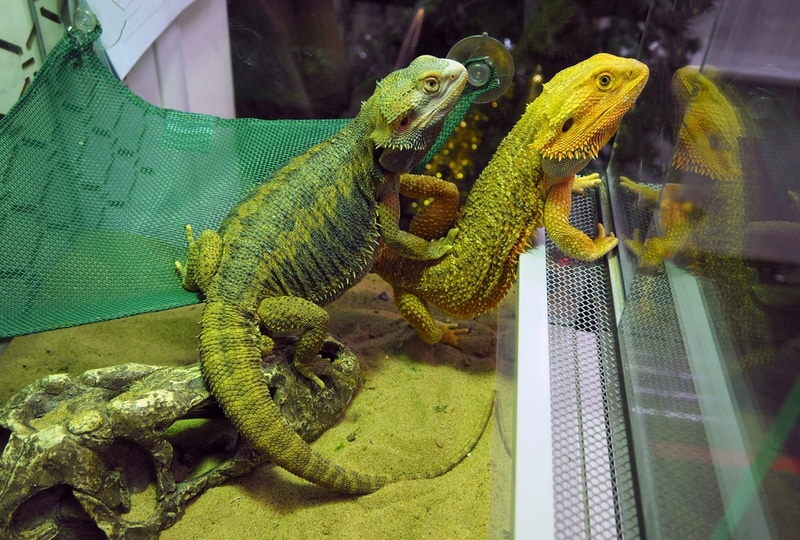
The 5 Ways How To Calm Down a Bearded Dragon
Now that you understand what stress looks like, you need to know how to relax your bearded dragon. Consider what could be causing the stress. If you can fix the problem, provide plenty of TLC, and be patient as they recuperate, you can successfully bring your bearded dragon’s behavior back to normal. The following are a few common causes of stress to assess if you’re wondering why your bearded dragon is acting aggressive, sluggish, and out of sorts:
- Your bearded dragon only recently came into the home
- Too much handling
- You relocated or repositioned the cage
- The tank temperature is too high or low
- You added new items to the tank
- The tank is too small
- Loud noises, such as vacuum cleaners, thunderstorms, or traffic
- You brought a new pet home
- They can see their reflection in the glass
There are many factors to consider, and solving the stress could take a bit of trial and error. Here are a few ways you can calm down your bearded dragon.
1. Check the Temperature in the Cage
Bearded dragons must have a basking spot around 105–115°F and a cool-down spot at 80–90°F. Humidity should be 35%–40% and nighttime temperatures need to be about 10 degrees cooler with the light off.
Controlling temperature is crucial as it keeps the lizards comfortable and regulates their digestion. Without a high basking temperature, they could suffer impaction, a dangerous digestive blockage. Use a thermometer or, better yet, a temperature gun to check your bulb’s output and make adjustments as needed.
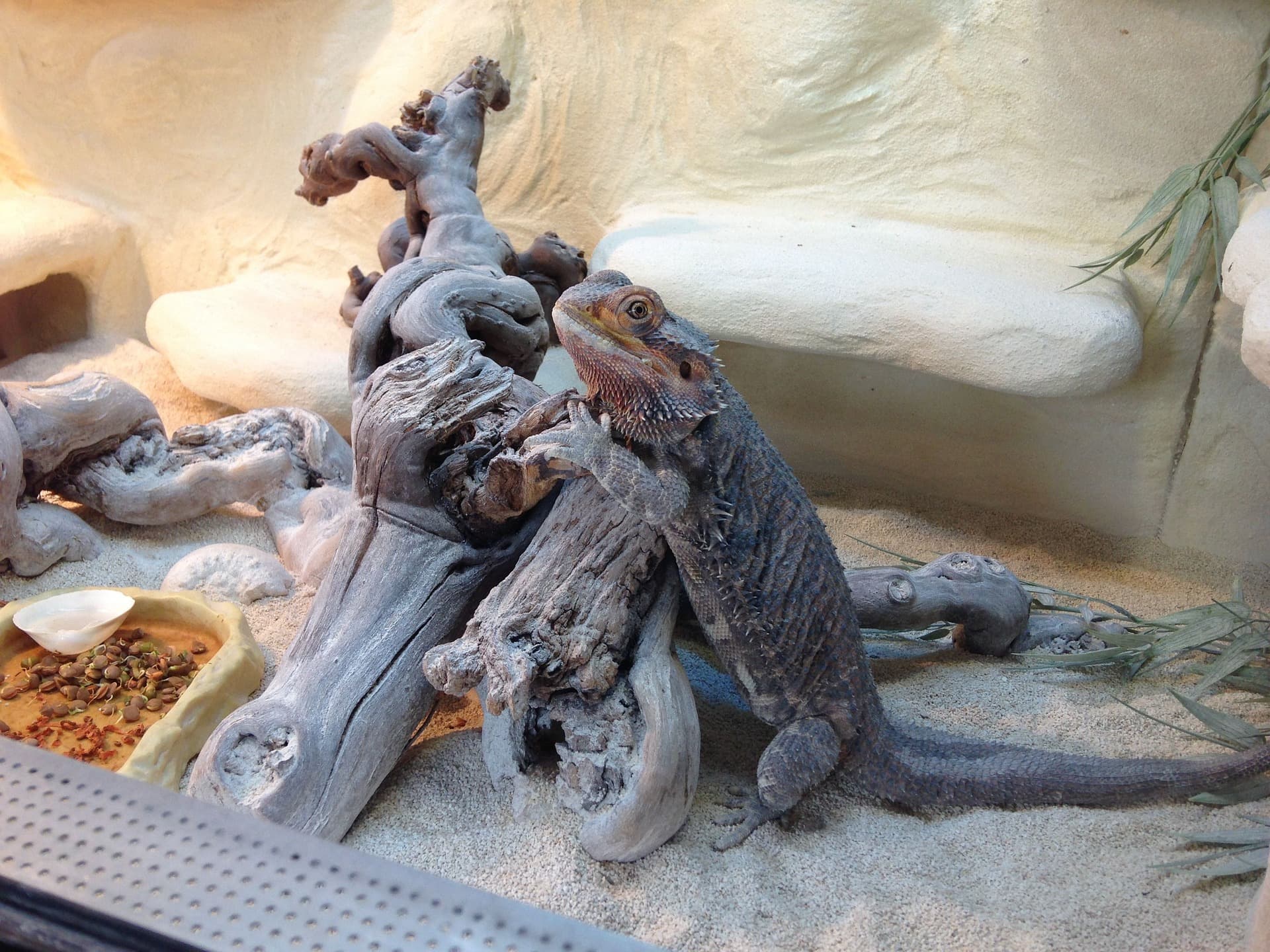
2. Limit Handling Time
Overhandling can be stressful for bearded dragons, especially when they’re not used to you. New and baby lizards need slow introductions. Speak softly to your bearded dragon, and don’t force them into your hand. Present your hand slowly, putting it in the cage and letting them explore it at their leisure. As they grow used to your scent, your hand could eventually become a source of comfort for them.
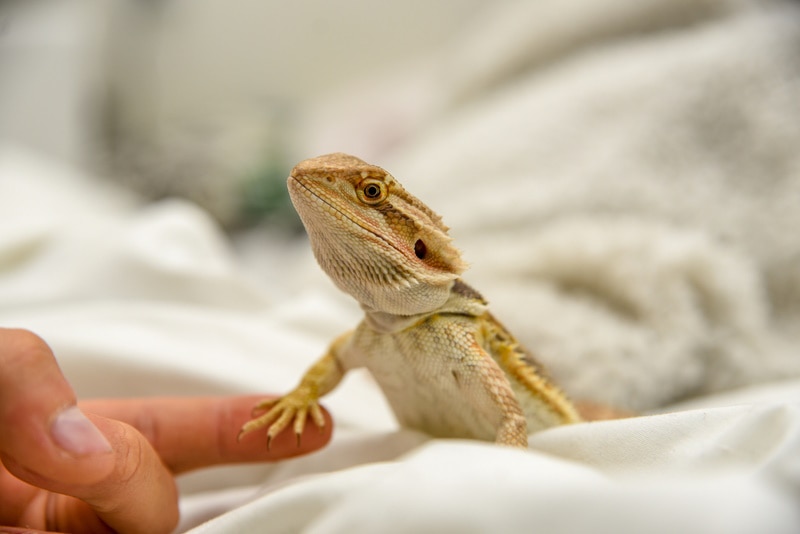
3. Bathe Your Bearded Dragon
Sometimes, a warm bath will perk your bearded dragon up and calm them down. Bathe them in a shallow pool of 85–93°F water, gently cleaning them as they soak for 10–20 minutes. A short bath is an excellent idea to help them during their shedding period.
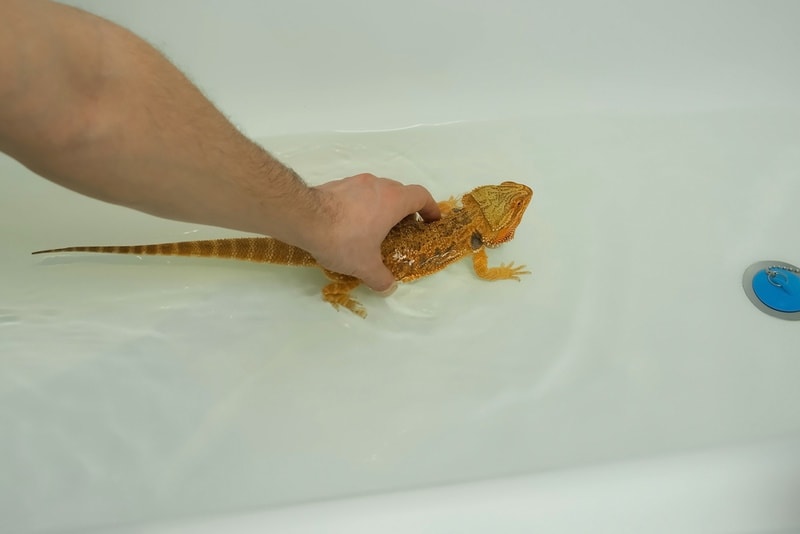
4. Keep the Environment Calm
Loud noises and other stimuli can excite and agitate your bearded dragon. While you can’t control every loud honking horn outside or dropped pan in the kitchen, you can monitor your habits and keep noise levels to a minimum.
Maintain a soothing speaking tone, and avoid making sudden noises. Consider covering your lizard’s cage to reduce visual stressors when they seem particularly overwhelmed. In some instances, people have also calmed bearded dragons by playing tranquil music.
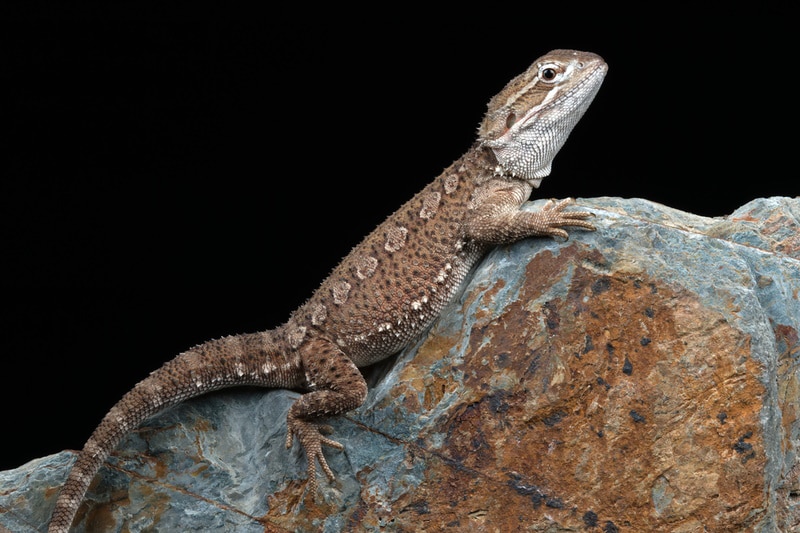
5. Entertain Your Bearded Dragon
Bored bearded dragons can get worked up when cabin fever develops. Wanting to escape, they might act antsy, glass surf, or become angry. Help them stave off restlessness by offering toys, cage features, and activities, such as balls, hides, cat toys, and hammocks.
Short rounds of interaction are as crucial as any enrichment item in the cage. Take your bearded dragon out for walks in your home and spend time playing with your pet. When your dragon is moving anxiously, give them time out of the enclosure for 10–15 minutes at a time.
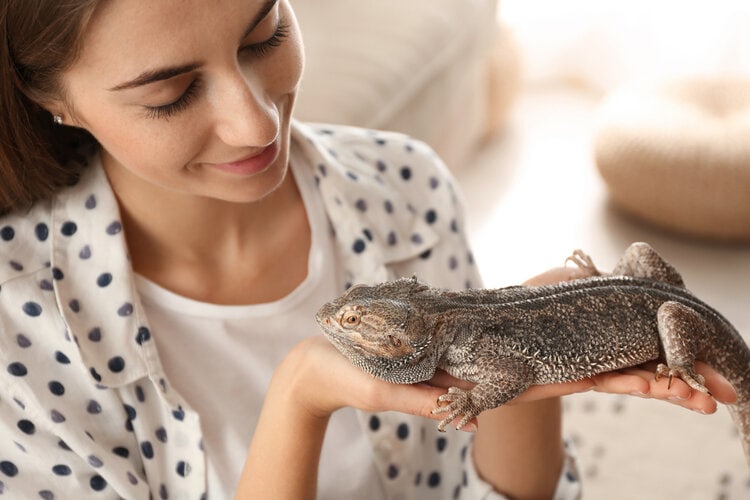
Do Bearded Dragons Get Calmer with Age?
Bearded dragons can be absolute spitfires when young, but fortunately, they generally settle down with age. Consistency in the environment is essential, as most animals will become more relaxed when their lives have predictability. Your bearded dragon will also become more familiar with you over time. To promote a calmer dragon and a quality bond, give them a healthy amount of interaction and add a piece of clothing with your scent to their cage.
Do Bearded Dragon Stress Marks Go Away?
Stress marks on adult bearded dragons come and go with the presence of the stressor, acting as a decent gauge to help you determine whether your efforts are paying off. Babies can hold their marks for several months. They take a while to become comfortable in their new space, and unless they are showing other signs of distress, you can rest easy knowing they’ll go away eventually.
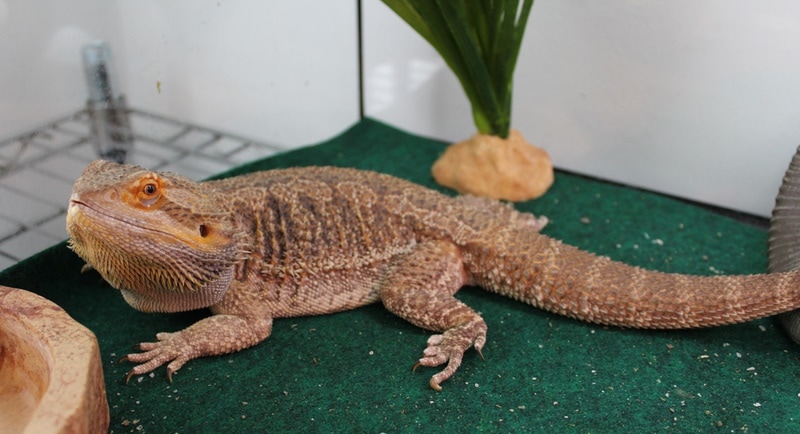
Final Thoughts
Stress isn’t uncommon with bearded dragons, nor is it always easy to resolve. Sometimes you can control it, sometimes, it’s nothing to worry about, and in other scenarios, it means there’s a more severe underlying health issue needing immediate attention. Follow these tips for calming down a bearded dragon, and talk with your vet if you don’t get results despite your best efforts.
- Can Bearded Dragons Eat Chicken? Vet-Reviewed Nutrition Facts & FAQ
- How to Tame a Bearded Dragon: 10 Tips to Follow
Featured Image Credit: New Africa, Shutterstock



